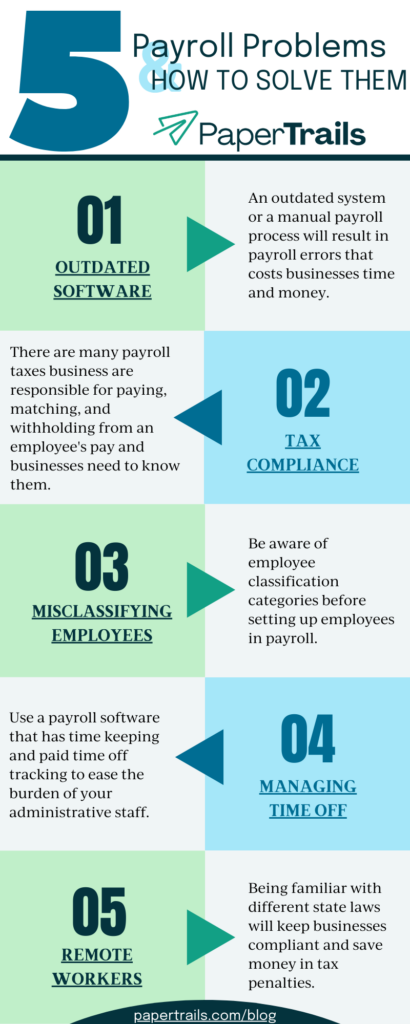One of the most important tasks in running a business is successfully managing a payroll management policy. From new employees being hired to old employees leaving, from changes in state and federal laws to updated forms and documents, managing payroll is tedious. There are many problems that may arise throughout the payroll process. Managing these payroll problems can be done efficiently with the right forethought and procedures.
Top Payroll Problems
Some of the problems that arise during the payroll process may be major and require procedural changes, while others maybe small and require a one time adjustment. Some of the most common, and most detrimental to a business, payroll problems are:
- Outdated Software
- Tax Compliance
- Misclassifying Employees
- Managing Time Off
- Remote Workers
While these are just a few of many problems that may arise, managing these problems effectively is crucial for saving time and money for any business.
Outdated Software
Using an up-to-date software, like isolved, that manages all steps of the payroll management process will optimize time and ensure compliance. An outdated system or a manual payroll process will result in payroll errors that costs businesses time and money. Time entries, overtime calculations, tax payments, benefits withholdings, and more are areas where errors can occur. Ensuring accuracy in payroll is critical to promoting employee engagement and retainment for any business and a payroll software is the first line of defense in eliminating errors.
Tax Compliance
There are many payroll taxes business are responsible for paying, matching, and withholding from an employee’s pay. Businesses need to know what these taxes are and set the calculations up correctly in their payroll system. Manual calculations of taxes opens the door for mistakes and fines. There are also pre-tax and post-tax deductions that need to be accounted for correctly to avoid tax headaches.
Staying up to date on federal and state legislative changes and using the most recent forms provided by the IRS ensures businesses are following the current guidelines. The “new” W4 is an important form to understand when trying to stay compliant on employee tax withholdings. Using an automated payroll software and working with a trusted vendor ensures businesses stay tax compliant.

Misclassifying Employees
One area where businesses face penalties and administrative headaches is employee classification. Certain employees are classified as 1099, or independent contractors. Having employees classified as either a W2 or 1099 employee correctly is key to avoiding any payroll problems at year end. Also, be aware of classifying employees correctly as either an exempt or non-exempt employee to ensure compliance regarding overtime rules and pay. Researching these differences beforehand results in employees being set up correctly when initial entered into a payroll system.
Managing Time Off
Employee paid time off is another area for businesses to focus on regarding payroll management. Keeping track of PTO correctly promotes employee satisfaction and saves businesses money. Use a payroll software that has time keeping and paid time off tracking to ease the burden of your administrative staff. Easy approval of time off requests in the software as well as automated balance adjustments optimize HR staff’s time. Manual tracking results in wasted time, tracking errors, and incorrect or late payroll submissions.
Remote Workers
Employing remote workers is becoming more and more popular. Research indicates that employee engagement and productivity are higher among remote workers than those that work in an office setting. As a business, remote workers can come with potential payroll headaches. Some of these remote workers may live in a different state than the state the business is located. This introduces new tax laws to the payroll process. Knowing the tax laws in the state in which the remote employee lives and does work is imperative. Being familiar with different state laws will keep businesses compliant and save money in tax penalties.